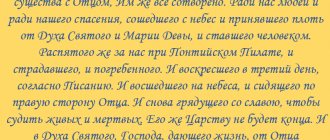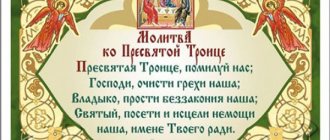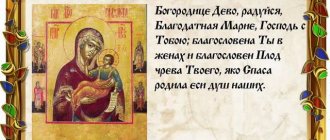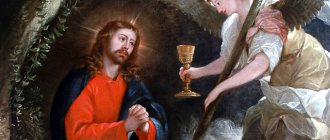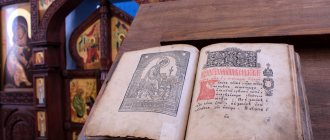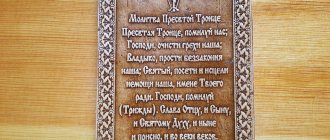Sometimes there is a need to turn to someone more powerful for support. This often happens in difficult times, when there is an understanding that not everything in this life depends on us. Then a person turns to the Lord with a request to protect him from evil thoughts and console him in grief, this is called prayer. Under no circumstances should you beg God for help in unclean deeds or the implementation of evil intentions. It is forbidden to ask God for execution for your enemies or for your own benefit, and you should not ask for worldly excesses, for example, wealth or fame.
About the author About the book
Of course, this is not a completely Christian understanding of prayer, but an appeal to God is already prayer. Consider, for example, the prayer “I Believe.”
“I believe in one God” - how and when to read this prayer
The prayer “I believe in one God” is one of the main prayers of Orthodoxy. Its solemn public singing in Temples is performed along with the prayer “Our Father” at each Liturgy; a person who consciously accepts the Sacrament of Baptism or who decides to be the successor (godfather) of a baby must know it. The prayer “I Believe in One God” is required for home reading; it strengthens spiritual strength, helps to overcome difficulties, strengthening one’s faith. You must not just memorize it, but try to understand and understand it.
History of appearance
In the 4th century, Ecumenical Councils were held, where teachers of the Orthodox Church discussed the postulates and dogmas of Christian teaching. At the Councils, the question was resolved of how to protect one’s flock from false prophets who intend to lead people into the darkness of their errors. As a result, a powerful fundamental prayer was created, which every believer needs to know. It contains a brief summary of the tenets of Christianity; helps to return to the bright path in the most troubled times of life.
The Creed is a very special line. In it you will not find any mention of names or appeals to God and the Mother of God, to the Guardian Angel and to the saints; there are no words of repentance and gratitude in it. And, nevertheless, the Creed in the Old Church Slavonic language is required to be studied and is published in all prayer books. If you were invited as a godparent to the baptism of a newborn, then you must learn these words for the godmother And the godfather teaches if a boy is baptized.
Prayer “I Believe in One God” - importance and meaning
Probably, “I believe in one God” is the only prayer that, in essence, is not such. In the text of the prayer there is no appeal to God, no dialogue with Him, no request, no contrition. “I believe in one God” is the essence, a brief summary of what the Church professes, this is a body of knowledge, a statement of the doctrine of the Holy Trinity, one and indivisible, the key issues of Orthodoxy.
The text of the prayer “I Believe in One God” gives an understanding of who God is . This is very important for a person who comes to Church and begins the Sacrament of Baptism. A rather short prayer gives him exact knowledge of what Christians believe and profess.
How to read a prayer correctly
You can turn to the Lord in several ways - verbal and mental. Verbal pronunciation of a prayer means pronouncing a prayer out loud. Mental prayer involves focusing the mind and emotions on turning to the Creator.
There are nuances that need to be taken into account when reading a prayer, because the texts are charged with powerful energy.
It is better to study prayer in the morning or afternoon; it is recommended to do it alone. Before studying, be sure to put aside your work, turn off the TV and mobile phone. The best options would be prayer patterns with emphasis.
Prayer “I believe in one God”
- I believe in one God, the Father, Almighty, Creator of heaven and earth, of everything visible and invisible.
- And in one Lord Jesus Christ, the Son of God, the Only Begotten, begotten of the Father before all ages: Light from Light, true God from true God, begotten, not created, one being with the Father, by Him all things were created.
- For the sake of us people and for the sake of our salvation, He came down from heaven, and took flesh from the Holy Spirit and the Virgin Mary, and became human.
- He was crucified for us under Pontius Pilate, and suffered, and was buried.
- And rose again on the third day according to the Scriptures.
- And ascended into heaven, and sits at the right hand of the Father.
- And He will come again with glory to judge the living and the dead; His Kingdom will have no end.
- And in the Holy Spirit, the Lord, the giver of life, who proceeds from the Father, worshiped and glorified with the Father and the Son, who spoke through the prophets.
- Into one holy, catholic and apostolic Church.
- I recognize one baptism for the forgiveness of sins.
- I'm waiting for the resurrection of the dead
- and the life of the next century. Amen (truly so).
The most powerful prayer to Cyprian against witchcraft and damage
Symbol of faith. What and why is he telling us?
Estimated reading time: 14 minutes.
There is one prayer in the Orthodox prayer book that is unlike all the others. There is no appeal to the Lord, no petitions to Him, no words of repentance and thanksgiving. It begins with the word “I believe...”, followed by a long list of what Orthodox Christians believe. This prayer is called the Creed. It was compiled back in the 4th century by the holy fathers of the First and Second Ecumenical Councils, and since then has been kept unchanged in the Church, expressing the main truths of Orthodoxy. All its parts were formulated as responses to very specific errors and distortions of Christianity. Professor of the Moscow Theological Academy Alexei Ilyich Osipov to tell us in more detail about the meaning of each of the members of the Creed .
I believe in one God, the Father, Almighty, Creator of heaven and earth, visible to all and invisible
It seems that a simple truth is being affirmed—the unity of God. However, nowadays it is increasingly used as an argument justifying the idea of one God in all religions and, therefore, their unity in essence. This rapidly developing trend in non-Orthodox theology leads to the fact that all other truths, in particular Christian ones, for example, about God the Trinity, about the crucified Christ, about the life of the future century, turn out to be unprincipled and therefore subject to exclusion. Thus, on the basis of the affirmation of the truth of the unity of God, all religions are mixed into one, something indefinite, vague both in doctrine and in the nature of spiritual life. The New Age is a clear model of such a new pseudo-religion. Father Seraphim Rose warned about it more than half a century ago, speaking about the coming “unified religion of the future” and the destruction of Christianity.
This tendency goes back to theosophical doctrine. In relation to Christianity, it found its expression in the ecumenical idea of uniting all Christian denominations into one Church. Super-ecumenism is already openly pursuing the idea of the unity of all religions.
Church earthly and heavenly
But the existence of one God does not mean at all that He is worshiped in all religions. Each of them has its own image of Him, and it can vary from the idea of absolute holiness to the satanic abyss. The Apostle Paul wrote about this: when pagans make sacrifices, they offer to demons, and not to God. But I do not want you to be in fellowship with demons (1 Cor 10:20 ). Therefore, “I believe in one God” means the Christian understanding of God - unlike all others.
And in one Lord Jesus Christ, the Son of God, the only begotten, who was born of the Father before all ages: Light from Light, true God from true God, begotten, uncreated, consubstantial with the Father, by whom all things were
The main question here is: Who is Christ? From the very beginning He was the fall and rebellion of many, not only in Israel. Faith in Him as the Son co-eternal with the Father, the true God, and not the highest creation of God turned out to be and remains to this day a stumbling block for the so-called. "sound mind".
At the end of the 18th century, French “enlightenment” scholars declared Him a myth.
In the Soviet Union, their idea was declared “the only scientific one.” And this is despite the fact that the testimonies of eight of His eyewitnesses have been preserved about Christ (in the books of the New Testament), that such famous historians of antiquity as Pliny the Younger, Tacitus, Suetonius, Josephus report about Him, and that a lot of material evidence has been preserved! Apparently, the calculation was based on the well-known principle of Goebbels: “For a lie to work, it must be monstrous.”
The question of Christ is becoming increasingly controversial... At the WCC assembly in Kenya in 1975, one speaker presented versions of modern ideas about Jesus Christ. They are different - from the Son of God, the Messiah to a talented preacher, idealist, psychic, revolutionary. In general - what is there...
Now in the civilized “free” world - in Europe, in the USA, a wave of open mockery of Christ (but not of Buddha, Moses, Muhammad) has unfolded. There are a huge number of facts. And persecution of His followers began all over the world. Statistics show that from 75 to 85% of all violations of religious freedom in the world happen to Christians. Every five minutes in the world someone is killed for Christ!
For our sake, man and our salvation came down from Heaven and became incarnate from the Holy Spirit and the Virgin Mary, and became human
We are talking about the only fact in the history of mankind of supernatural conception and birth from a Virgin without any marital relations. For Christianity, this truth is one of the cornerstones of faith. The Jews, the writers of the New Testament books, could neither borrow nor invent the idea of such parthenogenesis. It has no roots in Judaism, from which Christianity arose. It is fundamentally different from all pagan myths, and the Church has always uncompromisingly defended this teaching as the only true one and resolutely condemned all Judeo-pagan attempts to “correct” it.
It is enough to point out at least some of the differences between this Christian dogma and pagan ideas about the incarnations of gods to be convinced of its uniqueness.
The Incarnation refers only to the Second Hypostasis of God - the Logos, but not to God, as was natural for ancient mythology.
Christ is not another ancient deity who appeared in human form (docetically), but a real historical Person. He was born once, lived, suffered, died and was resurrected, not like the pagan gods, who could change their masks as much as they wanted.
He became incarnate out of love for man (John 3:16 ), “in order to make men gods and sons of God through union with Himself” (St. Maximus the Confessor), and not for any earthly pleasures and purposes. He has no avatars, He does not reincarnate.
He is pure from all passion - unlike pagan deities (for example, Krishna, according to one legend, had 8 wives and 16 thousand concubines, from whom he had 180 thousand sons).
Such a teaching could not have been created by the apostles - unlearned people (Acts 4:13 ), this is not the fruit of the “earth”. It was evidence of the real fact of the appearance of the incarnate God-Logos Himself. Therefore, the doctrine of the Incarnation is one of the obvious arguments for the divine origin of Christianity.
Christmas
4-5. She was crucified for us under Pontius Pilate, and suffered and was buried. And he rose again on the third day, according to the scriptures
These members of the Creed are another objective argument testifying to the unearthly origin of the Christian religion. If we turn to the psychology of the vast majority of people (I think this is 99.9% of humanity), then we can say with complete confidence that they live in hope and expectation of someone who will free humanity from wars and cruelties, exploitation and violence, and will give in abundance " bread and circuses” will bring “peace and security” to the earth (see 1 Thessalonians 5 :3). Dreams of heaven on earth have existed since the beginning of human existence, and they were expressed in various ideologies, government ideals and legends about the coming savior of the world. It is enough to recall the dreams of the Jews about the Messiah or the Romans about the new Augustus and the reaction of both to Jesus Christ: the first crucified Him, the second sent “Christians to the lions.”
Therefore, is it not obvious that in the natural order the apostles, these ordinary Jews, could not have even thought of accepting their Crucified Teacher, who did not justify any of their hopes, as the Savior of the world? It is no coincidence that the Apostle Paul exclaimed: we preach Christ crucified, a stumbling block to the Jews, and foolishness to the Greeks (1 Cor 1:23 ). This could not have happened if the apostles, having witnessed His terrible execution, death agony, death, burial, had not themselves repeatedly seen Him, “resurrected on the third day, according to the scriptures.” This is an obvious psychological fact, which is simply pointless to dispute. And isn’t it direct evidence of the resurrection of Christ!
What is sufficient evidence in historical science or in legal proceedings? - Eyewitness accounts. Everything else is secondary. So, those who directly and in different circumstances came into contact with the risen Christ testify to the resurrection of Jesus Christ. Moreover, if you become familiar with the nature of the experiences of these witnesses during their meetings with the Risen One, with their doubts and outright disbelief in the Resurrection (how wonderful, for example, the disbelief of the Apostle Thomas and his assurance: My Lord and my God are described!), then no doubt remains in the reliability of their “testimony”. And how many witnesses: Matthew, Mark, Luke, John, Peter, Paul, the author of the Acts of the Apostles!
Such a number of eyewitnesses of the Risen One and their subsequent unshakable confession of this fact in the face of terrible torture and death penalty is more than sufficient proof of the resurrection of Christ.
Therefore, attempts to present the New Testament messages about the Resurrection of Christ as another myth in the series of resurrecting gods of the religions of Egypt, Asia Minor, Rome, Greece: Dionysus, Osiris, Attis, Adonis look downright absurd. These gods, according to all researchers, were only symbols of nature dying and resurrecting every year. That is why they are “born” and “die” every year, their “life” is inexorably determined by the changes of the seasons, their very suffering and death are random, meaningless, and do not bring with them any spiritual changes in a person. There could be no talk of any real resurrection of these mythical figures, since they are ideas, not historical figures. And that anyone would give their life for believing in such “resurrections” - history does not know about this.
Christ rose again once. His Resurrection was the beginning of the deification of humanity and the source of the general resurrection. Paganism has never known such a thing (cf.: When they heard about the resurrection of the dead, some mocked, while others said: We will hear you about this at another time (Acts 17:32).
The Resurrection of Christ is the cornerstone of the Christian faith. The Apostle Paul wrote: and if Christ has not been raised, then our preaching is in vain, and your faith is also in vain... you are still in your sins (1 Cor 15 :14,17). Therefore, millions of people suffered for this faith.
And ascended into heaven, and sits at the right hand of the Father
How much this fact says for the Christian understanding of man! With the Ascension of Christ, the truth about the highest dignity of man is revealed in full - he is first (at the right hand) of God! Even the highest angels do not have such glory.
Eternal Council
And again the coming one will be judged with glory by the living and the dead, His Kingdom will have no end
These words confess several fundamental truths of human existence.
First of all, it talks about the event that completes the earthly history of mankind - the Second Glorious Coming of Christ.
Next - about the Last Judgment. During the general resurrection, the soul will unite with the renewed body and the complete restoration of man will occur. Here the will that was lost with death will return to man, and he will have the opportunity to fully consciously determine his attitude towards God. For at this judgment, which is often called terrible, on the basis of the experience of earthly life, the experience of the posthumous state of the soul and the revealed vision of the love of Christ and His Kingdom, which will have no end, the final self-determination of each person will occur.
Finally, the words “judge the living and the dead” affirm the truth of the immortality of the human person, the truth of the resurrection of the dead and the same judgment over them as over those who did not survive death, but, according to the word of the Apostle, changed into a new body (see 1 Cor. 15:51-52).
And in the Holy Spirit, the Lord, the life-giving, who proceeds from the Father, who with the Father and the Son is worshiped and glorified, who spoke the prophets
Here, firstly, the Orthodox faith is affirmed in hypostasis, that is, in the particularity, or individuality, of the life-giving Holy Spirit, distinct from the individualities of the Father and the Son; secondly, His consubstantiality and equal worship with the Father and the Son; thirdly, the truth about the procession of the Holy Spirit from the Father (which was subsequently damaged in Catholicism by the new doctrine of Filioque - “and from the Son”).
Into one holy, catholic and apostolic Church
The Church is the unity in the Holy Spirit of all who freely follow the will of God, expressed in the Gospel and commandments of Christ. For only freely and meaningfully can one enter into this Theanthropic Organism of Christ - His Body (Eph 1:23 ). Therefore, the Church is one.
A church is also a name for a society of people united by the unity of faith, canons, hierarchy, and sacraments. In this visible Church-community, the Holy Scriptures, the works of the Holy Fathers are preserved, the Sacraments are performed, and so on, which opens up the possibility of salvation for the believer. Members of the Body of Christ are also born into it. However, the visible Church is only a shell, a visible organization, a community in which anyone can be a member: a baptized criminal, and the greatest saint.
Therefore, it is impossible to identify these two concepts of the Church, just as it is impossible to transfer the flaws of the visible Church and the life of its members to the Church - the Body of Christ. For every Christian and all members of the visible community belong to the Church only to the extent to which they follow Christ in their spiritual and moral life. Through sins a Christian falls away from the Church, but through repentance he returns again, as evidenced by the permissive prayer of the priest over the repentant: “Reconcile and unite the saints of Your Church.” That is why the Church is called and always remains holy. But history testifies that not a single Local Church is immune from degradation and even complete disappearance. In this regard, the example of Western churches is very indicative.
The conciliarity, or catholicity, of the Church, based on the content of the Greek word όλη, can be expressed as integrity, indivisibility into parts, that is, organicity, which fully corresponds to the apostolic definition of the Church as the Body of Christ. The concept “catholic” (Greek kafolikh) expresses the ontological property of the Church, which speaks not about the simple unity of believers in faith, in prayer, in life, but about their organic unity in the Body of Christ (1 Cor. 12:27).
Finally, the Church is called apostolic not only because the apostles were its foundation, but also because it calls all its members to the apostolic mission - both in word and by example of life to testify to Christ the Savior.
I confess one baptism for the remission of sins
Baptism is a spiritual birth that occurs only when a person has faith. As the Lord Himself said: He who has faith and is baptized will be saved, but he who does not have faith will be condemned. That is, one who receives Baptism without faith is condemned because he treats the Sacrament as magic. All the holy fathers teach about this. St. Ignatius (Brianchaninov) wrote with bitterness about formally accepted Baptism: “What benefit can there be from Baptism when we, accepting it at an age, do not understand its meaning at all? What benefit can there be from Baptism when we, having received it in infancy, remain completely unaware of what we have received?
What happens in Baptism was clearly stated, for example, by Saint Simeon the New Theologian: “Then God the Word enters the baptized person, as into the womb of the Ever-Virgin, and abides in him as a seed.” In Baptism the seed of new humanity in Christ is given. And if a person approaches the Sacrament with faith and repentance, then he is cleansed of all his sins. But, as Rev. writes. Mark the Ascetic: “To those who firmly believe, the Holy Spirit is given immediately after baptism; but it is not given to the unfaithful and evil-believing after baptism.” And if the baptized person does not maintain the purity of the soul with a correct Christian life, then what the Lord warned about can happen to him: When the unclean spirit leaves a person, it walks through waterless places, looking for peace, and does not find it; Then he says: I will return to my house from where I came. And, having arrived, he finds [it] unoccupied, swept and put away; then he goes and takes with him seven other spirits more evil than himself, and entering they live there; and the last thing for that person is worse than the first (Matthew 12 :43-45).
Therefore, our Church is now introducing mandatory public conversations before Baptism.
Entry of the Righteous Soul into Paradise
Tea of the resurrection of the dead
The importance of faith in the general resurrection is demonstrated by the words of the Apostle Paul: If there is no resurrection of the dead, then Christ was not raised... therefore those who died in Christ perished. And if in this life only we hope in Christ, then we are the most miserable of all people (1 Cor 15 :13,18-19). Belief in personal immortality, which allows you to see and realize the fruits of your activities, is the basis of any reasonable worldview. Without such faith, a person’s life is simply meaningless. F.M. Dostoevsky wrote: “Only with faith in his immortality does a person comprehend his entire rational goal on earth.” “Without faith in one’s soul and in its immortality, human existence is unnatural, unthinkable and unbearable.”
And the life of the next century. Amen
All that is revealed about the life of the future century is that it is eternal. But the concept of eternity is not related to time, these are different categories. Therefore, both in the Holy Scriptures and in the holy fathers about the eternal fate of man, we find, on the one hand, clear statements about the bliss of the righteous and the torment of sinners, on the other hand, these torments themselves are considered either as eternal-infinite, or as eternal, but having an end.
This duality is due, first of all, to the impossibility of conveying the content of the concept of “eternity” in human language. Another reason for the duality, perhaps stemming from the first, is the formal contradiction of the doctrine of endless torment with the fundamental dogma of God-love, who created man for eternal good, and His foreknowledge of the eternal fate of the one to whom He gives existence.
Hence both Scripture and the Fathers speak of both the eternity and the finitude of the suffering of sinners. Since the latter is less known, I will give some evidence.
Thus, in the wake of the Matins of Good Friday we hear: “Deliver all from the bonds of death by Your resurrection...”.
On Holy Saturday: “ Hell , but does not reign over the human race forever...” This idea is repeated in many liturgical texts.
Holy John Chrysostom: "The sun of justice [Christ] made hell heaven ." In the Easter Homily: “He devastated hell . Christ is risen, and not one is dead in the tomb !
Holy Epiphanius of Cyprus: “He brought out captive souls, and made hell empty.”
Holy Amphilochius of Iconium: “ everyone was released ... everyone ran after Him.”
Holy Gregory of Nyssa: “... and after the complete elimination of evil from all beings, God-like beauty will again shine in everyone .”
Holy Gregory the Theologian about sinners: “Perhaps they will be baptized there by fire - this last baptism, the most difficult and lasting, which consumes matter like hay and consumes the lightness of all sin.”
Holy Athanasius the Great: “He redeemed the entire human race from death and raised it from hell .”
St. Ephraim the Syrian: Christ will “ completely abolish it ” (hell).
St. Isaac the Syrian, as if summing up this thought, wrote: “If a person says that only in order for His long-suffering to be revealed, He makes peace with them [sinners] here in order to mercilessly torment them there - such a person thinks inexpressibly blasphemous about God... Such... slanders Him.” “The merciful Lord did not create rational beings in order to mercilessly subject them to endless sorrow - those whom He knew before their creation what they would turn into after creation, and whom He nevertheless created.”
That is, according to the thoughts of these Fathers, the life of the future century is not an eternal dualism of good and evil, heaven and hell, but, as the Apostle Paul writes: God will be all in all (1 Cor 15:28 ).
I write more about this in my book “From Time to Eternity: The Afterlife of the Soul.”
Illustrations by Elena Cherkasova
“I believe in one God” - we analyze the text of the prayer in Russian
The text of the prayer “I Believe in One God” consists of 12 parts.
The first part of the text of the prayer begins with the word “I believe,” I don’t know, I don’t understand, but I believe, that is, I confess God, I trust Him. Next is the doctrine of God the Father, who contains everything in his power, power, and is the Creator of the entire visible material and invisible spiritual world. God the Father is the beginning and the end, the head of all things, he has no time, no reason. You can only come to the Father through Christ.
Members of the text of the prayer “I Believe in One God” from the second to the seventh contain the teaching of the Church about Christ, the Son of God, who was begotten, and not created by the Father, before all times. He was and is one with the Father, the world was created by Christ, God created the whole world by His Son, Christ is the second hypostasis of the Father.
Further, the text of the prayer “I Believe in One God” tells that in the form of a man the Lord was incarnated on earth through the action of the Holy Spirit and the Mother of God. He is the Son of Man according to the flesh, therefore, like all people, he experienced fatigue, pain, needed food, drink, rest, and worked. Like God, he preached and performed miracles of healing the sick and raising the dead. The only thing that distinguished him from people was the absence of sin.
But the world did not accept him. The light and divine love that Christ brought into the world turn out to be unbearable for people. He is given over to a painful execution. The Son of God endures unbearable suffering, crucified on the Cross. Following the Crucifixion is burial. This is very important, because Christ is not called dead, death is the end of earthly life, and the Son of God won victory over it, destroyed its dominance and hopelessness - all these events are briefly described in the text of the prayer “I Believe in One God.”
Three days later Christ was resurrected. The Bible says this. Its texts contain predictions about the resurrection of Christ. This miracle was witnessed by the apostles Peter and James, the disciples Luke and Cleopas, the myrrh-bearing women and many other people who, after what they saw, began to preach Christianity. For forty days the risen Christ instructed and strengthened his disciples in the faith, walking with them from Jerusalem to the Mount of Olives.
Here, before the eyes of the disciples, the Ascension of Christ took place. He ascended to Heaven visibly, in his human form. But as God, Christ was always in unity with the Father and the Holy Spirit .
Further, in the text of the prayer “I Believe in One God,” it is stated that at the Second Coming Christ will be the King of Glory, who will judge both the living and the dead. But He is merciful, therefore, knowing all human sins, He will look for how to justify, and not condemn. And the Kingdom that comes after the judgment will be endless.
Read morning prayers
The eighth member of the text of the prayer “I Believe in One God” is an affirmation of faith in the Holy Spirit, an integral and equal part of the Trinity, as coming from the Father and giving life.
The ninth is about faith in one Church, Holy, created by the Lord himself, Catholic and Apostolic, preserving the continuity from the Apostles, in which the Holy Spirit acts.
The tenth part of the text of the prayer “I Believe in One God” is about confession, recognition of Baptism as a Sacrament in which a person is united with Christ, God the Father and the Holy Spirit. Baptism is performed once, as a birth, the beginning of a new renewed life, rebirth and hope for salvation.
The eleventh is about waiting for the resurrection of the dead. Man is endowed with an immortal soul, which leaves the body after death. But the Son of God, as a man, having passed through the earthly path, with his Resurrection showed that death is not final. For the Judgment, the Lord will resurrect the dead, and they will appear before His court on an equal basis with the living.
The final part of the text of the prayer “I Believe in One God” is about aspiration, expectation of life after the general resurrection and transfiguration in a Kingdom that does not know suffering, illness and troubles.
The prayer ends with “Amen” - so be it.
Prayer “I Believe in One God” - differences between prayer in Russian and Church Slavonic
For many people, understanding texts in Church Slavonic is difficult. Therefore, there are several translations of the text of the prayer “I Believe in One God” into Russian. They undoubtedly make the text easier to perceive, but do not convey depth and even reduce the fullness of awareness of the meaning of the prayer.
The Church Slavonic language is inimitable, unique, and poetic. For many words there are no synonyms, or even analogues in modern Russian, so many constructions in translation convey the meaning of the phrase approximately. But since the Russian language borrowed a lot from the Church Slavonic language, many words are understandable without translation - incarnate, life-giving, verb, tea, confession. For comparison, we present the text of the prayer “I Believe in One God” in Church Slavonic.
Brief historical background on the origin of prayer
The prototype of the “Creed” originated during the formation of the Church. Even then there were several short truths, the purpose of which was to remind baptized converts of what they should believe. Over time, as the rite of baptism underwent changes, the prayer began to take on its modern appearance, and new formulations were included in its content.
This version, in which the “Creed” exists now, was compiled at the First and Second Ecumenical Councils. The first was held in 325, in Nicaea, the second - in 381, in Constantinople (Constantinople). Based on the names of these cities, the modern “Creed” was called Nicene-Constantinopolitan. During the First Council, the first 7 truths of prayer were compiled, during the Second - the remaining 5.
The text of the prayer “I Believe in One God” in Church Slavonic.
- “I believe in one God, the Father, Almighty, Creator of heaven and earth, visible to all and invisible.
- And in one Lord Jesus Christ, the Son of God, the only begotten, who was born of the Father before all ages; Light from Light, true God from true God, begotten, uncreated, consubstantial with the Father, to whom all things were.
- For our sake, man and our salvation, who came down from heaven and became incarnate from the Holy Spirit and the Virgin Mary and became human.
- Crucified for us under Pontius Pilate, and suffered and was buried.
- And he rose again on the third day according to the Scriptures.
- And ascended into Heaven, and sits at the right hand of the Father.
- And the one who is to come will judge with glory the living and the dead, His Kingdom will have no end.
- And in the Holy Spirit, the Lord, the Life-Giving One, who proceeds from the Father, who is with the Father and the Son, we are worshiped and glorified, who spoke the prophets.
- Into one Holy, Catholic and Apostolic Church.
- I confess one baptism for the remission of sins.
- Teaching the resurrection of the dead,
- and the life of the next century. Amen."
Prayer to St. Nicholas the Wonderworker, changing fate in 40 days, is very powerful
Text of prayer with accents
You should prepare for this in advance, because the difference between your home readings and church readings can be striking. Here you can find the version you need, which can be printed with accents .
Try to memorize the lines, there are not many of them. Even if it is needed for a single event. Firstly, this way you will show the importance of the event to which you are invited. And secondly, the Creed will be useful to you more than once. Each of us has difficult moments, difficulties, illnesses, betrayals. To survive them easily and with dignity, take into account the Creed. If you doubt that at a crucial moment you might forget a word or two, here is an option for printing with accents in large font.
Text of the prayer “I Believe in One God” - history of creation
It is believed that the text of the prayer “I Believe in One God” was created at the 1st Ecumenical Council of Nicaea (325) - the first part and the second Ecumenical Council of Constantinople (381) - the second part, but this is not entirely true. Long before this, there was the Caesarea Baptismal Creed, the predecessor of the current text of the prayer “I Believe in One God,” which was pronounced before the Sacrament of Baptism. It is very similar to the one that was accepted in Nicaea, and in Constantinople the Jerusalem baptismal confession of faith was taken as a basis. The Holy Fathers at these councils approved and supplemented the already existing dogma.
The main purpose of convening the first Council was to expose the heresy of the priest Arius, who rejected the divine essence of Christ, recognizing him only as the highest creation of God the Father. In the text of the baptismal Creed, the predecessor of the current text of the prayer “I Believe in One God,” only one word was added, which had a defining, highest meaning. This is the word “consubstantial” , which confirmed the Divine nature of Christ , refuting the Arian heresy.
The Second Council, with its edits to the text of the prayer “I Believe in One God,” suppressed the heresy of Marcellus of Ancyra, who argued that Christ, as the incarnation of God, is a temporary phenomenon, and the time will come when the Son of God will “disincarnate,” becoming one with the Father. This refuted the doctrine of Christ, the Trinity, and Salvation. Therefore, in the Creed, to the words about Christ, “before all ages” and “His Kingdom will have no end” , confirming that the Son of God was, is and will always be, and will always reign in the unity of the Trinity.
“Creed” is one of the main Orthodox prayers
This prayer was compiled at the First and Second Ecumenical Council. The prayer appeal consists of parts: the first seven parts were written by the holy fathers at the First Ecumenical Council in the city of Nicaea in 325, and the remaining five parts were an addition to the Second Ecumenical Council, held in Constantinople in 381.
The uniqueness of this prayer lies in the fact that it reminds all Christians of the essence of their faith. This prayer service in the temple is basic for all branches of Christianity: Orthodox, Catholics and Protestants.
The importance of prayer in the life of every believer
This prayer is an affirmation of what itself is a great great mystery. No one can say with certainty whether a person gains faith during his lifetime or whether it is given to him by the Almighty. There is a constant debate in Christianity about what awaits after death for people born in a different culture and who believe in something different. We can definitely say that if a person adheres to universal human rules during his life and lives with love and sincerity in his heart, then the doors to the Lord's paradise are open to him. Every person deserves this, regardless of their religion. The main thing is that goodness reigns in the soul. And each person makes this choice independently.
The “Creed” prayer is a means of uniting all believers, and this is its great secret. She seems to create one big family out of all people, and directs everyone together towards the Light of God. It conveys in brief form everything that a believer should remember.
According to its text, to believe means not to accept anything that the enemies of Christianity claim. Although none of the people saw God during their lifetime, one must believe that this will definitely happen in the future. Each of us must also believe that after death a bright heavenly kingdom awaits us, and not a cold, silent void. And this gives strength to live and enjoy every minute. This is precisely what the word “I believe” emphasizes in prayer.
Mandatory prayer for a child's baptism
This prayer must be read at baptism. In this ritual it plays the role of an oath. If an adult is baptized, he reads it himself. Through prayerful words, a person at baptism swears to the Lord to accept faith and God himself in his heart.
When a foolish infant is baptized, the prayer is said by one of the godparents. Moreover, it is customary that when a boy is baptized, the prayer is read by the godmother, and when a girl is baptized, the godmother must say the prayer test. It is advisable that godparents confess and receive communion before the baptism ceremony.
The importance of godparents in a child’s life cannot be overestimated. These people are witnesses to the birth's acceptance of the Holy Faith of Christ. From now on, they must support him throughout his entire life. And if, by the will of the Lord, something happens to the parents, then the godparent must compensate the child for this loss and take care of him all his life.
You should know that it is not necessary to have two godparents. This is a popular interpretation rather than a church rule. But on the other hand, it is very important that the godfather must be a Christian. Otherwise, the baptism ceremony will be invalid.
As a result of all that has been said, parents must approach the choice of a godfather or godmother for their child thoroughly. This could be a relative or a stranger, but it is very important that he is close to you in spirit and you can trust him with your child.
When to read the Creed prayer
This prayer must be read at every service. Therefore, a person who was present at least once heard it. All believers usually sing it together. The prayer is so strong that it is allowed to read it not only in the original, but also in Russian as close as possible to the original text. It is absolutely not necessary to memorize the text, the main thing is to put all the sincerity of your soul into every spoken phrase.
The “Creed” prayer should be read at bedtime and in the morning. It allows you to maintain true faith in a person’s soul and will not allow you to deviate from the true path by succumbing to devilish temptations. In addition, to strengthen faith, it is recommended to recite the prayer text in any difficult life situation.
If you read this prayer before going to bed, you can forget about all the failures that happened the previous day and rethink the current situation. That is, it will be possible to find new, more correct solutions the next day. In the morning, this prayer helps to properly tune in to the new day. It is also recommended to read this prayer in case of serious illness, but this should be done only after the main prayer.
The “Creed” prayer can not only be read, but also listened to. This does not diminish its effect. The main thing is to think about her phrases and realize them. Such prayer audio text should under no circumstances be used as a background to any activity.
Origin of the prayer “I Believe in One God”, video
Share with your neighbor
Similar articles:
- Prayer Our Father in Russian text
- Prayer Virgin Mary Hail text in Russian
- Confession: how to properly confess before communion
- Mother's prayer for children is strong
- Matrona Moscow Prayer
- Who is a cleric in Orthodoxy?
- The most powerful prayer to Cyprian against witchcraft and damage
- What is the difference between Orthodoxy and Christianity?
- What does the feast of the Presentation of the Lord mean in Orthodoxy?
- How to prepare for Unction in church during Lent
